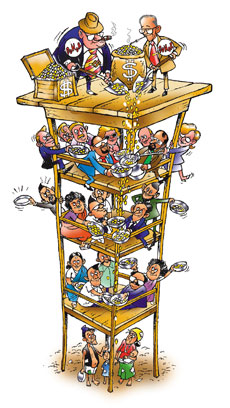 Having defanged an autocratic monarch and convinced the Maoists to rest their weapons, Nepal had hoped for an aid windfall. This has not happened. Election day is 69 days away and aid is unlikely to increase before then - or immediately after.
Having defanged an autocratic monarch and convinced the Maoists to rest their weapons, Nepal had hoped for an aid windfall. This has not happened. Election day is 69 days away and aid is unlikely to increase before then - or immediately after.
Nepal needs extra cash but it is unlikely to come for two reasons. The donors remain divided on how to 'do' aid, and the government - as always - is factitious and divisive.
True, donors have forked out about Rs1.3 billion ($20 million) for the Nepal Peace Trust Fund (where the government put Rs1 billion) and its twin, the UN Peace Trust Fund. And they have spent several billion rupees on weapon stores, vehicles, tents, ballot boxes and computers, as well as funding peace seminars and organising 'get to meet a real Maoist' visits to European capitals. But such aid means very little where it matters most - in the lives of ordinary Nepalis.
"We have not seen a real peace dividend yet," said Jagadish Chandra Pokharel, vice-chairman of the National Planning Commission (NPC). "Some donors have added a few million dollars to their existing commitments but that cannot be called a peace dividend." The NPC's three-year interim plan for carrying out reconstruction and development has a tab of Rs162.5 billion ($2.5 billion).
Not all donors are satisfied with the outcome. "Donors need to understand the urgency of stepping up the support to the peace process and the peace dividend," said Bella Bird, head of DFID Nepal, the British government's development agency. DFID increased aid to $79 million (Rs 5.2 billion) in 2006/07 from $60.7 million (Rs 3.9 billion), and expects a rise to $95.2 million (Rs 6.2 billion) in 2007/08. Some top DFID officials are visiting Kathmandu next week, which could be a good opportunity for the government to better acquaint them with national priorities.
Donors have issued a torrent of statements supporting political developments in Nepal since April 2006, but government data indicate that bilateral aid actually declined in the first eight months of fiscal year 2006/07. Multilateral aid tripled in the same period, but this largely reflected old spending commitments rather than fresh grants and loans.
The situation is unlikely to change soon, especially as individual Nepali ministries continue to function as mini-governments and a unified Nepali voice on development priorities is still missing.
Most conspicuous among those reluctant to pay out is the European Union, whose member countries are divided between those who believe peace itself is the priority and those who see development as a way to encourage the peace.
An eerily similar donor divide paralysed king Gyanendra when he took direct control in February 2005. Then the European bilateral donors wanted democracy first while the multilaterals and the United States advocated keeping development aid flowing.
Recent top-level personnel changes at major funding agencies like the World Bank and Asian Development Bank are also a problem.
"It is like having a new minister coming to a ministry, when everything from the past tends to be pushed aside and new ideas are put on the table," said a donor source. "It's a situation where those coming in want to try out something new that has their signature."
In early 2006 the World Bank tried to steer the development process by asking government and civil society to agree on what they wanted for Nepal. No one talks about this anymore.
Donors now have the 'Peace and Development Framework' (PDF), which they proposed to the government some months ago, hoping it could guide the implementation of the three-year interim plan. The framework represents recognition - finally - among more than two dozen of Nepal's 'development partners' that peace and development are not mutually exclusive and that basic services must reach the villages in order to enhance peace.
But they are still waiting for the government to set out the detailed costs of the peace process and the implementation arrangements. And some, nervous of giving too much to a government which includes a former rebel force, have preferred to fall back on a traditional project-funding approach. This week, German development agency GTZ put $7 million into its own peace-building project rather than into the government fund.
"The weak government is a part of the problem," said Sudhindra Sharma, an aid analyst who feels the government should get firm with donors. "The next step should be telling donors what Nepal wants, and not taking what they want to give."
That, however, is unlikely to happen before a new constitution is approved. For Nepal, where the process to elect the constituent assembly still looks shaky, that's looking far into the future.


